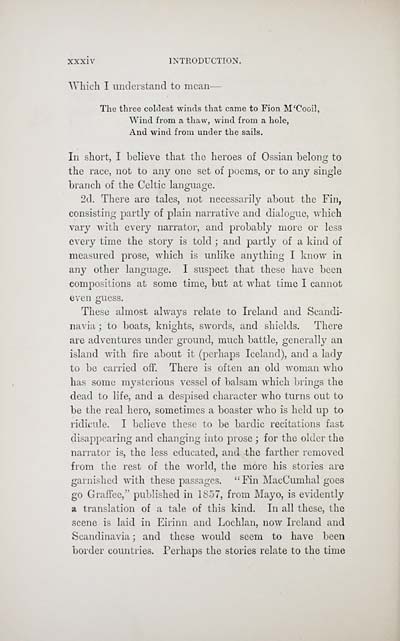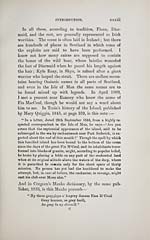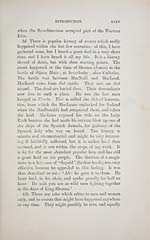Download files
Complete book:
Individual page:
Thumbnail gallery: Grid view | List view

XXXIV INTRODUCTION.
Which I vmdei'stand to mean —
The three coldest winds that came to Fion M'Cooil,
Wind from a thaw, wind from a hole,
And wind from under the sails.
In short, I believe that the heroes of Ossian belong to
the race, not to any one set of poems, or to any single
branch of the Celtic language.
2cl. There are tales, not necessarily about the Fin,
consisting partly of plain narrative and dialogue, which
vary with every narrator, and probably more or less
every time the story is told ; and partly of a kind of
measured prose, which is unlike anything I know in
any other language. I suspect that these have been
compositions at some time, but at what time I cannot
even guess.
These almost always relate to Ireland and Scandi-
navia ; to boats, knights, swords, and shields. There
are adventures under ground, much battle, generally an
island with fire about it (perhaps Iceland), and a lady
to be carried off. There is often an old Avoman who
has some mysterious vessel of balsam which brings the
dead to life, and a despised character who turns out to
be the real hero, sometimes a boaster who is held up to
ridicule. I believe these to be bardic recitations fast
disappearing and changing into prose ; for the older the
narrator is, the less educated, and the farther removed
from the rest of the world, the more his stories are
garnished with these passages. " Fin MacCumhal goes
go Graffee," published in 1857, from Mayo, is evidently
a translation of a tale of this kind. In all these, the
scene is laid in Eirinn and Lochlan, now Ireland and
Scandinavia; and these would seem to have been
border countries. Perhaps the stories relate to the time
Which I vmdei'stand to mean —
The three coldest winds that came to Fion M'Cooil,
Wind from a thaw, wind from a hole,
And wind from under the sails.
In short, I believe that the heroes of Ossian belong to
the race, not to any one set of poems, or to any single
branch of the Celtic language.
2cl. There are tales, not necessarily about the Fin,
consisting partly of plain narrative and dialogue, which
vary with every narrator, and probably more or less
every time the story is told ; and partly of a kind of
measured prose, which is unlike anything I know in
any other language. I suspect that these have been
compositions at some time, but at what time I cannot
even guess.
These almost always relate to Ireland and Scandi-
navia ; to boats, knights, swords, and shields. There
are adventures under ground, much battle, generally an
island with fire about it (perhaps Iceland), and a lady
to be carried off. There is often an old Avoman who
has some mysterious vessel of balsam which brings the
dead to life, and a despised character who turns out to
be the real hero, sometimes a boaster who is held up to
ridicule. I believe these to be bardic recitations fast
disappearing and changing into prose ; for the older the
narrator is, the less educated, and the farther removed
from the rest of the world, the more his stories are
garnished with these passages. " Fin MacCumhal goes
go Graffee," published in 1857, from Mayo, is evidently
a translation of a tale of this kind. In all these, the
scene is laid in Eirinn and Lochlan, now Ireland and
Scandinavia; and these would seem to have been
border countries. Perhaps the stories relate to the time
Set display mode to: Large image | Transcription
Images and transcriptions on this page, including medium image downloads, may be used under the Creative Commons Attribution 4.0 International Licence unless otherwise stated. ![]()
| Early Gaelic Book Collections > Matheson Collection > Popular tales of the west Highlands > Volume 1 > (54) |
|---|
| Permanent URL | https://digital.nls.uk/81387876 |
|---|
| Description | Volume I. |
|---|---|
| Shelfmark | Mat.74 |
| Additional NLS resources: | |
| Attribution and copyright: |
|
| Description | Items from a collection of 170 volumes relating to Gaelic matters. Mainly philological works in the Celtic and some non-Celtic languages. Some books extensively annotated by Angus Matheson, the first Professor of Celtic at Glasgow University. |
|---|
| Description | Selected items from five 'Special and Named Printed Collections'. Includes books in Gaelic and other Celtic languages, works about the Gaels, their languages, literature, culture and history. |
|---|

